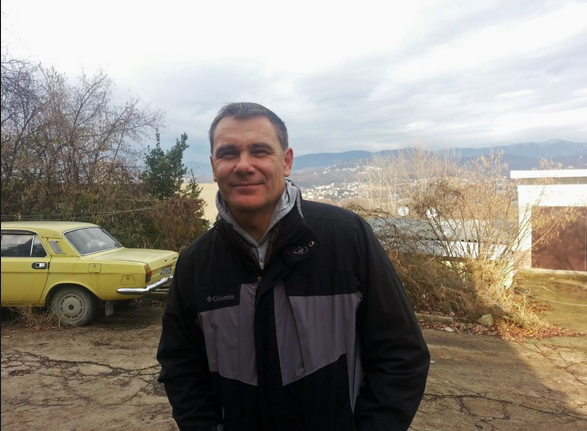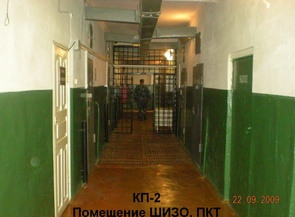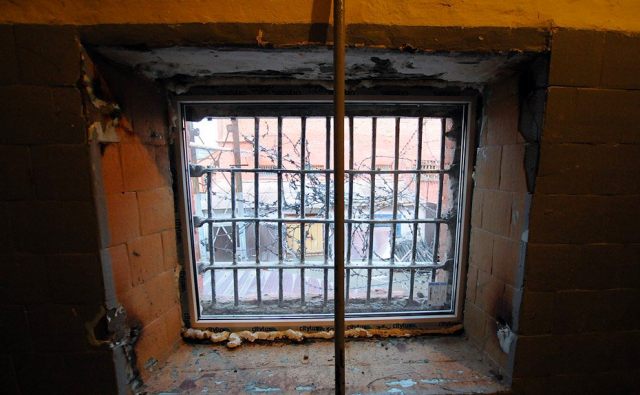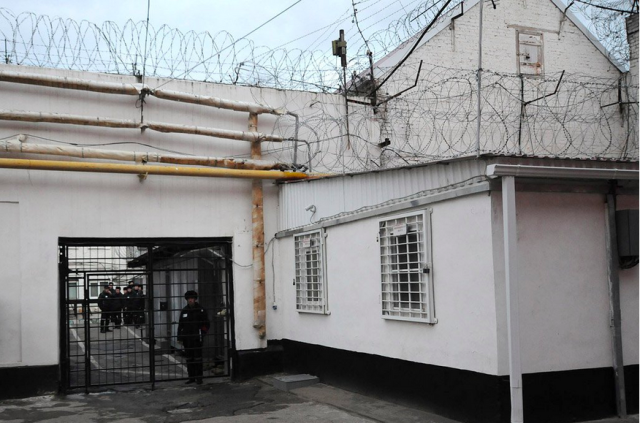
Bellona nuclear digest. May 2024
A survey of events in the field of nuclear and radiation safety relating to Russia and Ukraine.
News

Publish date: March 7, 2014
News
Yevgeny Vitishko, the imprisoned activist whose scathing criticism of the environmental turmoil visited on the Sochi Region by Russia’s Olympic build out – and whose whereabouts have been unknown since Monday – has finally been located at a Tambov Region prison colony.
Vitishko was earlier this week confirmed to be in transit to a prison colony in that region, but penal system officials and NGOs working on his behalf were unable to confirm which one he was being sent to. Penal officials’ inability or unwillingness say where Vitishko was headed was worrying.
Vitishko has disappeared three times while in the hands of jailers since his arrest on February 3 for supposedly swearing at a bus stop in his hometown of Tuapse on the Black Sea coast, 70 kilometers northwest of Sochi.

But Vitishko earlier fell afoul of Moscow’s zero tolerance policy of dissent that might cast the Sochi Olympics – a prized Kremlin project to show the world “the modern Russia” – in a dim light. Other members of his group, the Environmental Watch on the North Caucasus, endured perpetual harassment and detentions before the Olympics, which only intensified when the Games’ torch was lit.
Anna Mitrenko of the Public Monitoring Committee, a prisoners’ rights group affiliated with the Presidential Council for Human Rights, today told Bellona that Vitishko has finally been located at Settlement Colony No 2 – also known as the Sadovy Colony – in the Tambov Region, some 1,000 kilometers north of Tuapse.
Harassment of ecologists as Olympic policy
Beginning in November and continuing through the Games, at least eight EWNC members, were detained, some of whom were jailed for three to 15 days, and two of its supporters viciously beaten on national television. Five EWNC activists were jailed over Russia’s sacred New Year’s holidays. One EWNC member, Suren Gazaryan, received political asylum in Estonia last year as the legal harassment against him piled up.
Another EWNC member, Igor Kharchenko, was arrested and roughly handled by police on February 5 when hired thugs vandalized his car. When EWNC members witnessed three men smashing up Kharcheko’s car via close circuit television, they phoned to local police station.
When squad cars arrived, uniformed officers arrested and jailed Kharchenko for five days for disobeying police orders. Apparently, he did not produce his documents quickly enough.
And Nadezhda Tolokonnikova and Maria Alyokhina of the punk collective Pussy Riot were detained by Sochi police on February 18 for what Tolokonnikova told Bellona by telephone from custody were their activities in support of Vitishko.
The next day, when Tolokonnikova and Alyokhina attempted a to perform a song dedicated to Vitishko and other Russian political prisoners, entitled “Putin Will Teach you to Love the Motherland,” they were attacked by Cossack militiamen wielding pepper spray and horsewhips.
EWNC, Pussy Riot, and other Vitishko supporters say the coordinated campaign against the environmentalists was designed to keep them from making their findings on Olympic ecological scorched earth policy know to the international media.
As the Olympics in Sochi have given way to the Paralympics, EWNC members report via twitter, telephone and on Facebook that they continue to be followed and harassed by police.
The Vitishko penal shell game
Vitishko will be spending the next three years in the Sadovy colony for supposedly spray-painting a construction fence in 2011. The construction fence, built on protected forest lands in the Western Caucasus Nature Preserve, surrounds the no-longer secret mansion of Krasnodar Regional Governor Alexander Tkachev.

Vitishko and other witnesses say he is not responsible for spray-painting the fence at all. The graffiti written on the fence – reading “This is Our Forest” and “Tkachev is a Thief” – by two young women who tagged along for a demonstration that Vitishko led against the fence, witnesses told Bellona.
Rights groups including Bellona, the Norwegian HelsinkiCommittee, Human Rights Watch and Amnesty International – who declared Vitishko a Prisoner of Conscience – also protest his innocence, and decry a three-year jail term for graffiti to be disproportionate the supposed crime.
Vitishko in quarantine over poor health
Mitrenko said today by telephone from Krasnodar that Vitishko is currently located in quarantine at the colony because he has been ill with a bad cough since being jailed in Tuapse’s Bolshevik-era holding facility.
Mitrenko had earlier established that he had received medication, but had not been seen by a doctor prior to his secret transport from Tuapse to Kransodar’s Remand Jail No 1, and further, to the Sadovy colony.

“Colony officials say he is in normal condition, but we can’t independently confirm that” Mitrenko said. “It’s general procedure that those who arrive at prison colonies with illnesses are quarantined until their health returns to normal.”
She was able to confirm, however, that Vitishko has not yet received any warmer clothes or any of his personal affects yet.
“It’s an uncomfortable situation,” she said. “He’s been wearing the same clothing since his arrest on the streets of Tuapse on February 3.”
On the day Vitishko was arrested during the Olympics, temperatures along the Black Sea coast were about 12 to 15 degrees Celsius. Temperatures in the Tambov Region today were listed by Weatherforecast.com as being minus 4 Celsius.
Mitrenko, Vitishko’s relatives and lawyers, and his colleagues at Environmental Watch on the North Caucasus have not yet been able to deliver any clothing or money to him.
“We will be working over the weekend with prison officials, EWNC and his lawyers to try to figure out how to get him what he needs,” said Mitrenko. She added that she and her colleagues will be following Vitishko’s conditions carefully given the rough treatment EWNC as a whole has experienced as a result of its anti-Olympic stance.
Now you see him., now you don’t
Vitishko had his appeal against a three-year custodial sentence imposed on him on December 21 overturned by the regional court of Krasnodar – the region where Sochi and Tuapse are located – overturned on February 12.
Initially, Vitishko was allowed to remain free until his appeal against December sentence, which was initially scheduled for February 22.
He was hastily jailed for 15 days on February 3 on what are widely viewed as trumped up public swearing charges meant to keep him from speaking to the media during the Olympics. Bellona was the last media to speak to him before his jailing.
After his arrest, his appeal date was moved up to February 12. This assured he would not be able to attend his appeal hearing in the Krasnodar Regional and speak in his on defense but via a scratchy, interrupted video connection to the Tuapse jail. Judge Andrei Konov deliberated for two minutes before overturning the appeal.
At that hearing, Vitishko was ordered to serve the remainder of his 15-day administrative detention. On February 18, he was, by order of the court, supposed to be freed temporarily on his own recognizance to return home, say goodbye to his wife, Larisa, and two sons, before turning himself into prison colony officials.
Instead, he was secretly transferred to Krasnodar’s remand prison that day, and put in a cell block for “especially dangerous criminals,” leaving his supporters and lawyers scratching their heads.

It later came to light that judge Konov had, after the sentencing, unilaterally ordered that Vitishko be transported to the penal colony under armed guard.
He was eventually located at the remand prison by Mitrenko, and visited by his Krasnodar-based lawyer Marina Dubrovina, who reported he was in poor health.
His location again became a mystery on Monday, February 24 – the closing day of the Olympics – when EWNC’s Anna Mikhailova tried to deliver a parcel to him at the Krasnodar jail and was told by officials he was no longer there.
“Now that he has finally reached the prison colony, my colleagues (at the Public Monitoring Committee) and his lawyers will continue to follow his condition and treatment,” said Mitrenko.

A survey of events in the field of nuclear and radiation safety relating to Russia and Ukraine.

But it’s unlikely to impact emissions from shipping along the Northern Sea Route.

In this news digest, we monitor events that impact the environment in the Russian Arctic. Our focus lies in identifying the factors that contribute to pollution and climate change.

The following op-ed, written by Bellona’s Charles Digges, originally appeared in The Moscow Times. In recent months, the Russian nuclear in...